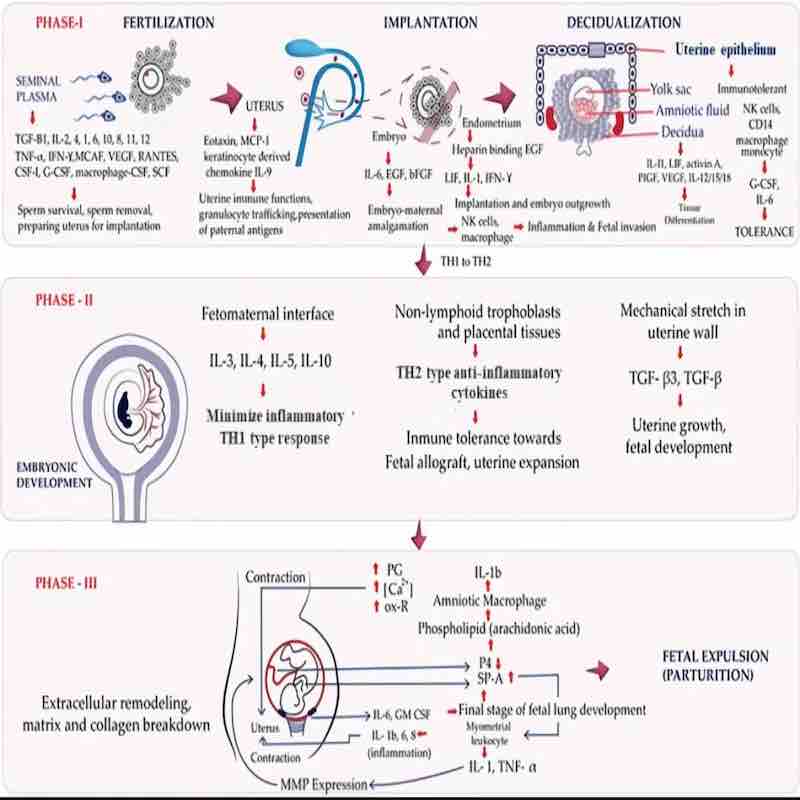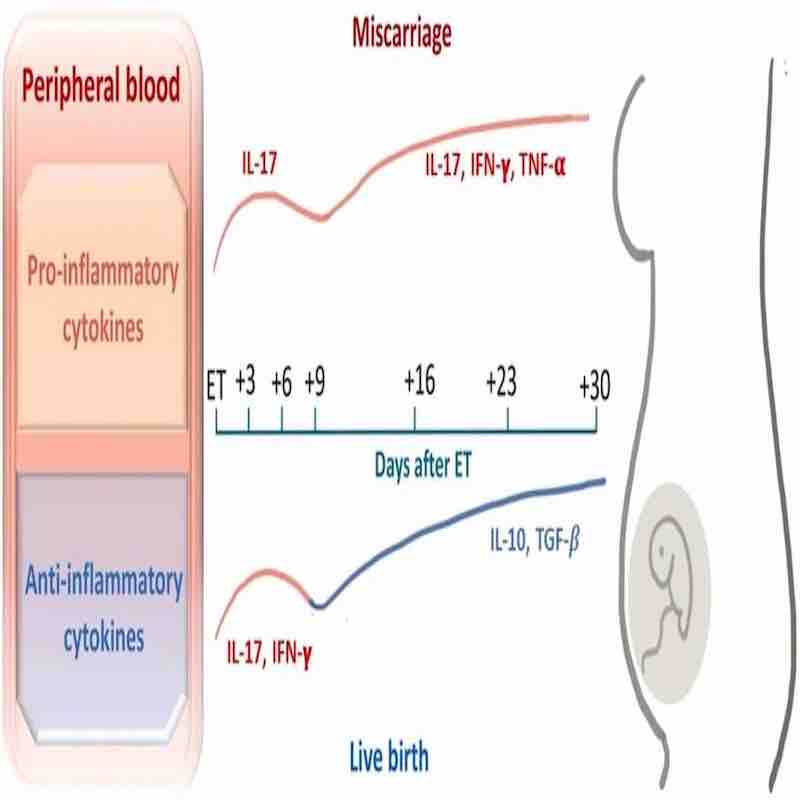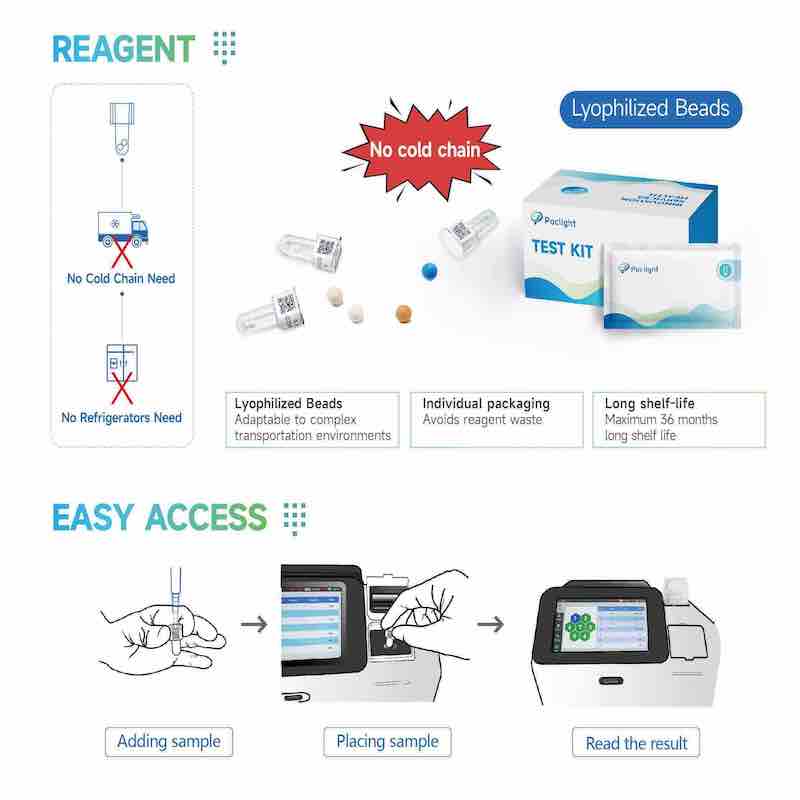As an important bioactive substance, the role and power of cytokines in the human body have been widely recognized. From infectious diseases and hematology to oncology, the application of cytokines has demonstrated its powerful monitoring and therapeutic potential. In gynecological clinical practice, cytokine detection is an important auxiliary diagnostic tool, which helps doctors evaluate the immune status, inflammation degree and disease development of patients, and provides an important basis for formulating accurate and effective treatment plans.
1. Diagnosis of recurrent miscarriage
1.1 Cytokine profile during pregnancy
Depending on the changes in the cytokine profile that occur during pregnancy, they can be divided into three distinct stages.
During the first immunological phase of pregnancy, pro-inflammatory cytokines promote the inflammatory response required for implantation. In the second stage, changes from pro-inflammatory to anti-inflammatory cytokines create a symbiotic relationship between maternal and fetal components, ensuring fetal development. In the third stage, inflammation and cytokines work again to strengthen the inflammatory environment of childbirth.

In the second stage of pregnancy, the changes of pro-inflammatory and anti-inflammatory factors are constantly dynamic, which is essential for the maintenance of pregnancy. A prospective study comparing the profiles of inflammation-associated cytokines and chemokines leading to miscarriage from the date of blastocyst transfer to 7 weeks' gestation found that serum cytokine profiles were similar during the implantation period (ET+0 days to ET+9 days) in subsequent miscarriage and non-aborted pregnancies. The spectrum from ET+16 days onwards showed a significant difference, with a significant increase in the pro-inflammatory cytokines IL-17, IFN-γ and TNF-α in the abortion group, and a continuous increase in the anti-inflammatory cytokines IL-10 and TGF-β1 in the healthy group.

1.2 Re-evaluating the role of cytokines
IL-17 is secreted by T helper cells 17 (Th17) and mediates inflammation and tissue destruction, and of all 12 cytokines measured, IL-17 is the most sensitive parameter to distinguish women with miscarriage. This difference was observed as early as ET+16 days (equivalent to 5 weeks' gestation), suggesting that overproduction may be associated with pregnancy maintenance failure.
IFN-γ is a pro-inflammatory cytokine produced by various immune cells. The increase in IFN-γ in the early stage favors the attachment and adhesion of embryos. The reduction of IFN-γ in late stage is critical, because IFN-γ can inhibit the invasion of extravillous trophoblasts by increasing apoptosis and decreasing protease activity, so overexpression may lead to miscarriage.
2. Diagnosis and treatment of adenomyosis with infertility
Adenomyosis refers to the invasion of active endometrial glands and stroma into the normal myometrium, accompanied by hypertrophy, hyperplasia and fibrosis of surrounding myometrial cells, which is a common gynecological disease in women of childbearing age. Infertility is when a woman has had normal sex without contraception for at least 12 months without pregnancy. In recent years, due to the continuous improvement of the level of diagnosis, more and more infertility patients have been detected with adenomyosis in the process of diagnosis and treatment, and the correlation between adenomyosis and infertility has been paid more and more attention.
3. Cervical cancer surveillance and prognosis
The imbalance of Th1 and Th2 may exacerbate the infiltration of macrophages, monocytes and neutrophils, and cytokines can promote the activity of antigen cells, and when the cell activity is abnormal, it may promote the abnormal activation of T cells, resulting in immune dysfunction and increasing the invasion ability of cancer cells. Aberrant expression of IL-4 and IL-6 factors associated with Th2 cells can lead to abnormal changes in cervical epithelial cells. Th1/Th2 imbalance will cause the body's immune system function to be suppressed, promoting the immune escape of cervical cells. Some scholars in China have found that the Th1/Th2 value of cancer patients is lower than that of healthy people. In this study, the analysis of indicators of cervical cancer patients with different clinical stages found that the later the clinical stage, the more severe the abnormal expression of IFN-γ, IL-2, IL-4 and IL-6, which further suggested the relationship between each immune factor and the condition of cervical cancer patients.
In clinical practice, Th1/Th2-related cytokine changes in cervical cancer patients can be monitored to carry out diagnosis and treatment plans early to improve the prognosis of patients.
Poclight, as a manufacturer, it has independent research and development patents. And our products, including cytokines detection lab poct dry clia analyzer, and the detection reagents—— Cytokine detection lab poct clia reagents, can bring you fast, accurate and easy tests. If you are interested in our China OEM Customized Laboratory Clinical Emergency Portable Poct Micro Chemiluminescence Immunoassay Analyzer, welcome to contact us, and we can provide you with trusted supplier of lab and poct solutions.


 English
English français
français русский
русский español
español português
português العربية
العربية 日本語
日本語 Türkçe
Türkçe हिंदी
हिंदी Indonesia
Indonesia 









 IPv6 network supported |
IPv6 network supported | 